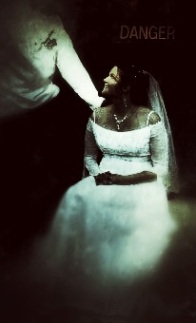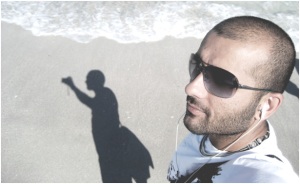Fourteen years ago today, I got married.
7 years and 7 days later, I told my husband I wanted a divorce.
This is why I’m celebrating my anniversary today.

Yes, that’s really a photo from my wedding. Yes, that’s really a “DANGER” sign above my head. Our photographer had a healthy sense of humor.
I was married for seven years and seven days. Can you say ‘seven year itch’? But, I don’t regret it. Yes, there are things I would have done differently if I had known back then, at the tender age of 22, that I know now at 36. My marriage brought me to Canada, my husband introduced me to a whole other world in communities of artists and hippies, and I would not trade this journey in for any other because I really love where it has led me today.
My ex husband, he is a good human. Today, he’s in a loving, long term relationship, and is flourishing while he builds his dreams into reality. I’m fortunate that our seperation and divorce was amicable and relitavely easy.
We were a couple that seemed to have so much going for us: a common spirituality, shared goals and dreams, similar values about family and raising children in community. And, we both loved cats. But, that wasn’t enough to make our marriage work. Both young— in our 20s when we got married— we struggled financially, and we struggled with making some tough decisions together. We both carried trauma that neither of us really recognised or understood, and would inevitably trip over eachother’s wounds, and then lash out in blame and anger. We would shout. We would cry. We would throw things around and slam doors and stop talking to one another. We minimized and dismissed eachother’s feelings. We both became depressed. We went through grief and loss with my miscarriages, and eventually, we came to realise that we were compromising so much of our core selves to try to stay together.
At the time, it didn’t seem so bad. Our relationship was not an obviously toxic one. There was no malice or physical violence. But, it seems obvious now to look back and see the toxic emotional and mental patterns we were both contributing to in the relationship: the codependancy, the conflict cycles, the unconsciously abusive ways we treated one another. I go through waves of being completely at peace with it, and then there are days, sometimes weeks or months, where the smell of someone smoking, or a door slamming, or a couple yelling at one another, triggers something inside me and I crumble, my psyche time-travels back to a handful of specific moments, and I freeze up.
I’m a big believer in the power of ritual as a means of letting go. Four years ago I took my wedding dress to Burning Man, and wrote on it all the things I had left unsaid in our marriage.

It was cathartic, powerful. I left my wedding dress in the temple, and later as I watched the temple burn down, I cried out what I thought would be the last tears I would cry about my marriage.
Of course, pain and trauma don’t work that way, and sometimes the ouchy memories cycle back because there’s still something you need to learn from them.
Today, as a relationship coach, I often see people coming to me in familiar situations in their relationships, where they are compromising pieces of themselves in an effort to maintain a relationship that is no longer nourishing them. I have so much love and compassion for folks going through this. I know first hand how it starts off feeling like a loving thing to do— sacrifice something you want and make the other person happier. Our social code around relationships encourages this kind of martyrdom. But, what’s the pay-off for that? If martyrdom becomes our primary love language, how do our own needs ever get met?
In the past seven years I have learned a lot about this. Stepping out of my own patterns for self-sacrifice for a partner and into a stronger relationship with myself is an ongoing journey — and I’m still a work in progress. I’ve had so many diverse and nourishing relationships since my separation and divorce, and I’ve come to realise that relationships can be the greatest teachers: not only does the other person hold up a mirror for you to see yourself, but you can be challenged to hold true to your Self and not fall into the patterns of partner-pleasing (and other toxic monogamy scripts).
When I was 22, I didn’t have a framework for how to have healthy relationships, and thought self-sacrifice was the key. By my late 20s, I knew what an unhealthy relationship felt like, ad that I was unwilling to be a martyr for the sake of a partner. Today, I’ve got a framework for healthy relationships, one that is inclusive of polyamory, monogamy, and everything in between. It nourishes all my own relationships (including non romantic and non sexual ones) and has helped me in my own journey of healing. And that’s part of why I choose to do what I do as a coach. I don’t want others to feel held back by patterns in their relationships where they keep misunderstanding or misinterpreting one another, nor do I want people to feel disempowered and trapped by toxic dynamics.
Last night I had a dream where my now ex-husband came up to me and handed me a card. He began to speak and started to appologise for a long list of things that had happened in our relationship. I looked at him with love and said, “I’m sorry too. And thank you.”
In many ways my marriage— and the subsequent healing journey from my marriage— has been one of the biggest teachers. I ask myself, would I have found polyamory, if not for my marriage? Would I have catapulted into soloness, if not for my marriage? Would I have ever come to live in Canada, if not for my marriage? And, looking at the trajectory my life had been on before he came into my life (becoming an all grades school theatre teacher in the Middle East), would I have been any semblance of who I am today if my now ex-husband had not come into my life? Probably not. And so I know I’ve reached that profound place in healing where you can embrace the painful parts of your own journey, recognizing the wisdom you have gained through it all. And for all this, I am incredibly grateful.






